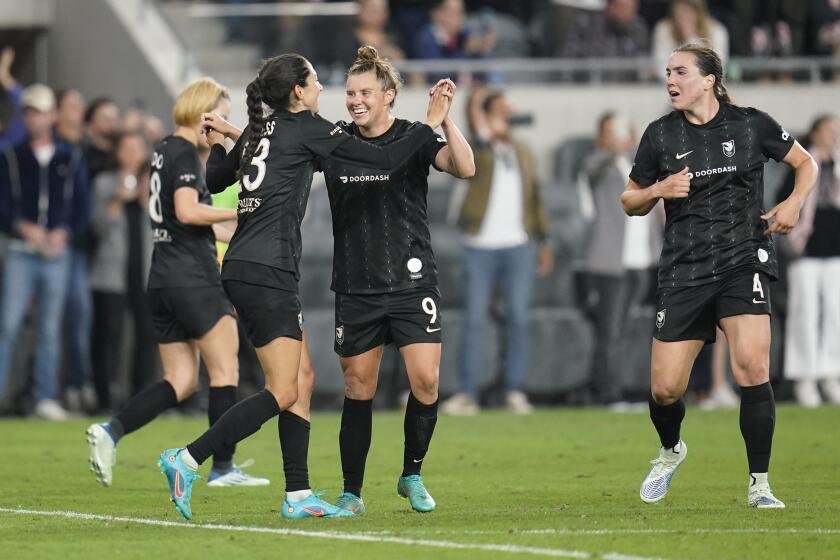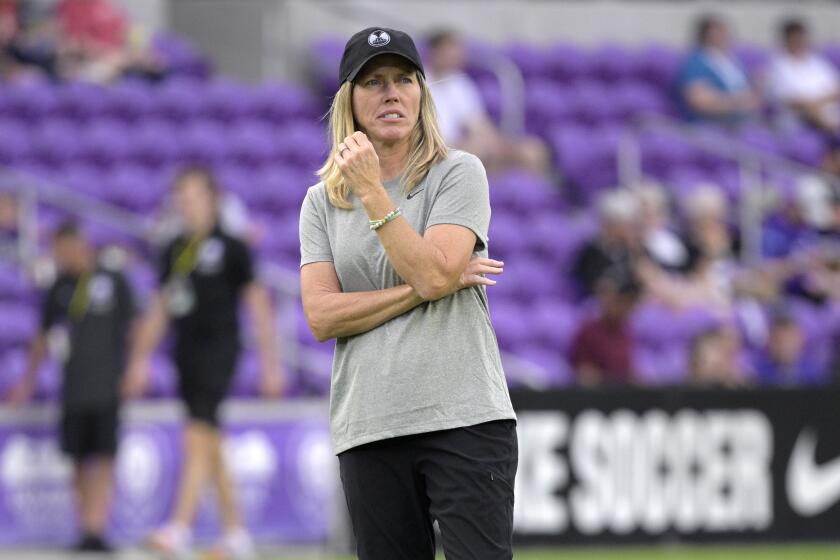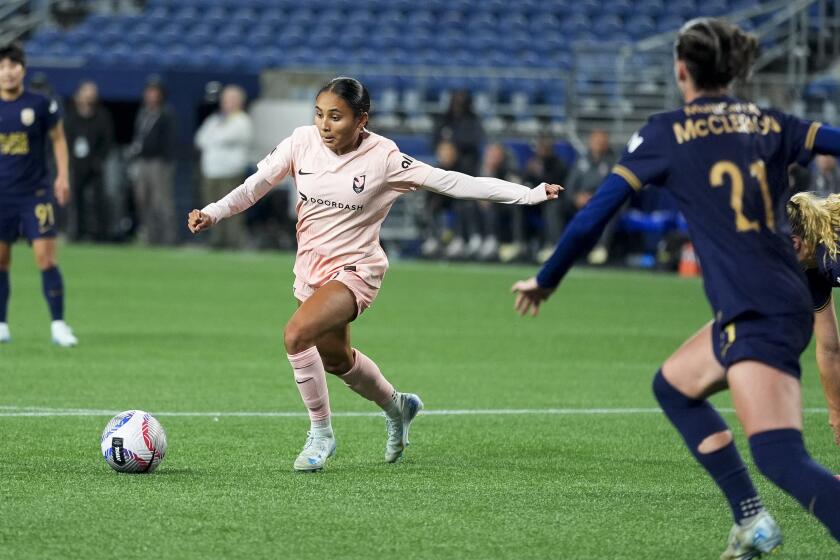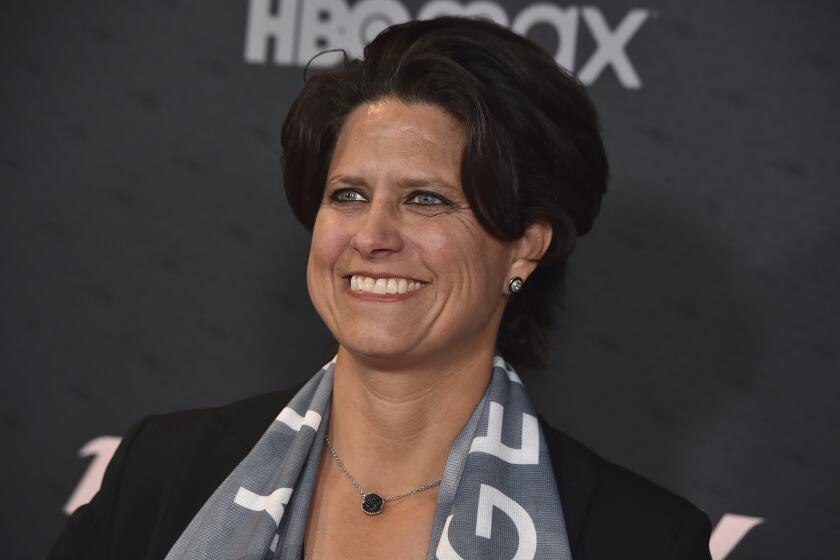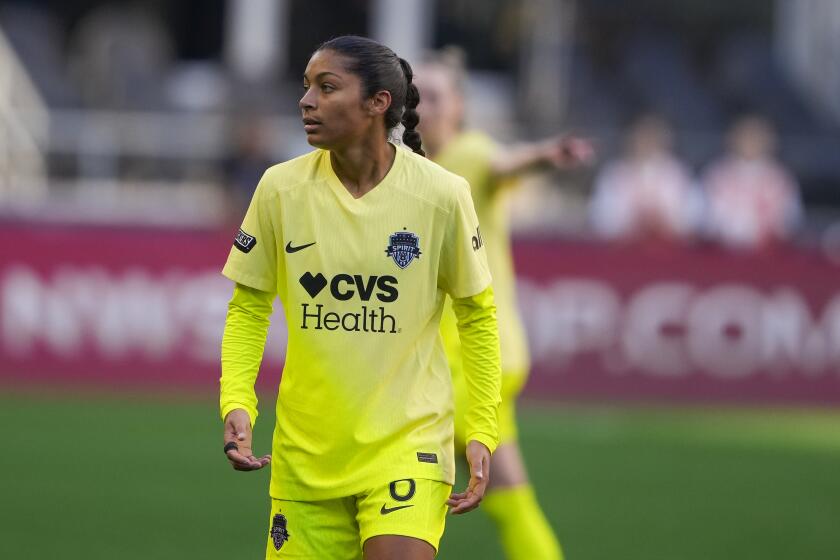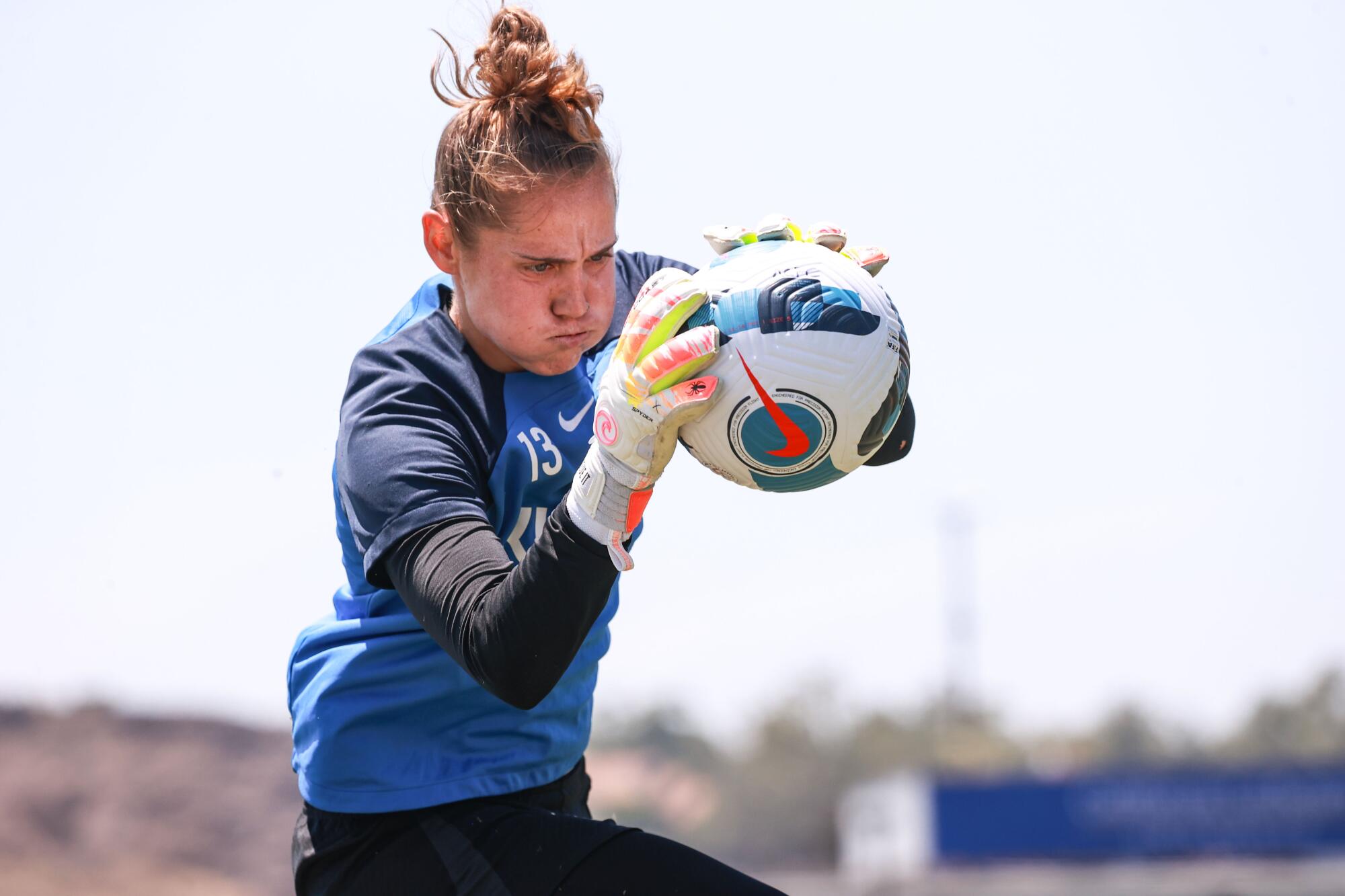
DiDi Haracic was hours old the first time she dodged death.
The siege of Sarajevo began 10 days before Haracic’s mom Anica gave birth, and when she was strong enough to stand, she swaddled the baby and walked out of the Koševo Hospital.
“The nurses told my mom to stay. And my mom specifically said, ‘No, we’re leaving,’ ” Haracic was told. “And we left.”
Weeks later, Haracic’s mother, who had no legal paperwork for her baby, took the child to Croatia, then to safety in Germany. At about the same time, the hospital was hit by Serbian artillery, one of most horrific acts of terrorism during the Bosnian War.
Angel City’s two-year partnership with Tigres Femenil of Mexico’s Liga MX will focus on community-impact events featuring fans and civic organizations.
“If I didn’t leave Bosnia, I just don’t think I would be here at all. We wouldn’t be alive,” Haracic said. “When the Serbians invaded Bosnia, they basically were hunting people down.”
It was poverty that nearly killed Stefany Ferrer Van Ginkel. Her 20-year-old mother, struggling with drug addiction, already had other children she couldn’t care for when the girl was born in a favela in central Brazil. Eventually the state stepped in and gave the mother a choice: She could have the drugs or her children but not both.
The drugs won.
So did the girls, who were put in an orphanage, then adopted by a couple who took them to a rural town about an hour outside Barcelona.
“I’m grateful. For everything that has happened to me,” she says now. “It’s just been like a really crazy ride.”
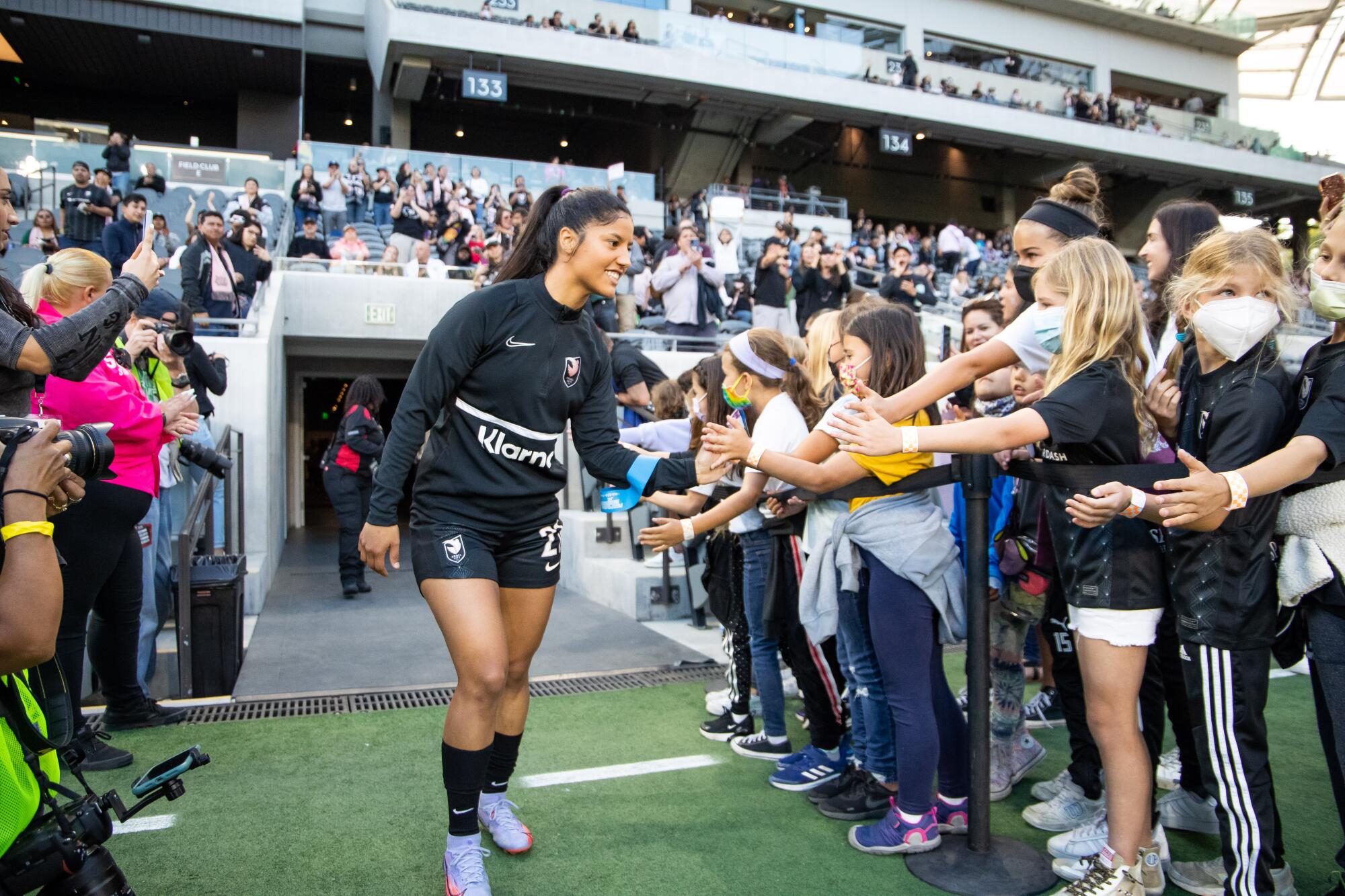
A ride that eventually led her to Southern California and Angel City FC, the NWSL franchise she joined a month after it had traded for Haracic. The two women share more than a locker room. For both, soccer has been the salvation, the foundation, the inspiration that helped them persevere long before the game became a career.
“Soccer has always been there for me,” Ferrer Van Ginkel said. “It’s helped me through life.”
Says Haracic: “I wouldn’t be here today after everything that’s happened.”
For Angel City coach Freya Coombe, likening life and death to a soccer match is a fraught comparison. Yet the hardships Haracic and Ferrer Van Ginkel have experienced have made them fighters, survivors and winners.
“Our character is built around our life experiences. And when players have been through really tough experiences, they certainly take coping skills and mechanisms and learn from it,” Coombe said. “They also can be really resilient to what life throws at them and the pressures that they do face within soccer.”
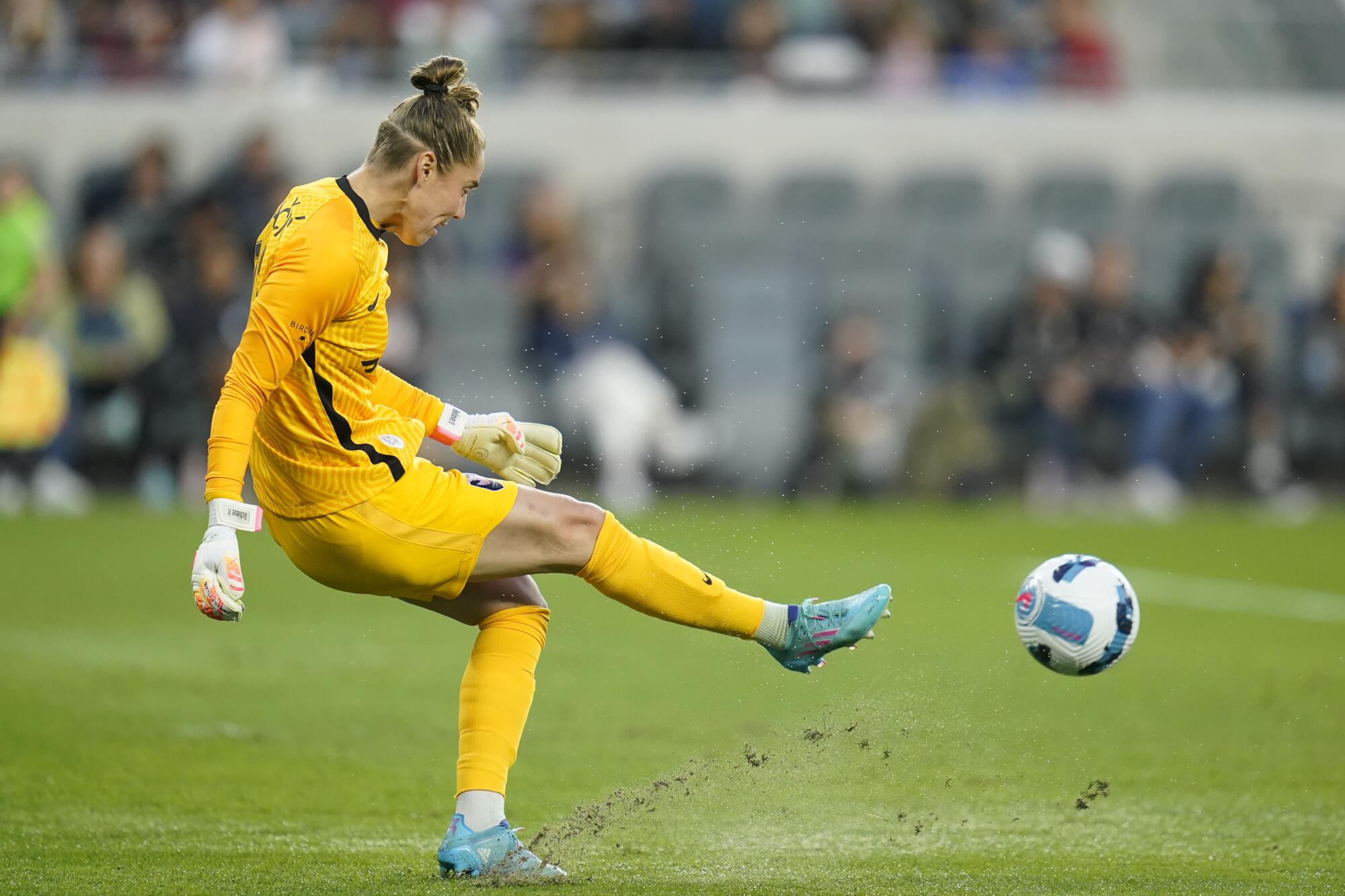
Though Van Ginkel has been frustrated by her inability to get off the bench through Angel City’s first four games, Haracic has been a star, posting shutouts in two of her four starts to help Angel City (3-1-0) to second place in the 12-team NWSL table heading into Sunday’s match with Gotham FC at Banc of California Stadium.
Haracic, 30, is not the first member of her family to play soccer at a high level. Her father Izzy played professionally in Germany and later competed in the bobsled on the first Bosnia and Herzegovina team in the Winter Olympics in 1994.
In between, he was part of the security detail for Bosnian President Alija Izetbegovic. The connections he had built over the years helped him get his family from Germany to northern Virginia, where DiDi, then 2, quickly discovered basketball and street hockey before falling in love with soccer.
“I did cry on my first national team game day. The national anthem, I think it all sinks in. It’s truly a powerful moment.”
— DiDi Haracic, on playing for Bosnia and Herzegovina in a World Cup qualifier
“My dad always wanted me to be on the field, so I don’t really know how this whole goalkeeping gig started other than I was just messing around at practice and my coach asked me, ‘Hey, we need a goalkeeper for this weekend’s tournament. Do you want to step in?’ ” remembers Haracic, who was 13 at the time. “I said, ‘Sure.’ We won the tournament and here we are now.”
She went on to play at Loyola Maryland, where she was named conference player of the year after leading the Greyhounds to the NCAA tournament. Her professional career, however, has been peripatetic, featuring stays with five teams in two countries over the last decade. Just once in that span did she start more than seven games in a season.
Fortunately, that came last season at Gotham City where Coombe was the head coach and Daniel Ball the goalkeeper coach. A day after the two were officially reunited at Angel City, they acquired Haracic in a trade.
“We all know each other to an extent,” said Haracic, who hasn’t given up a goal in her last 267 minutes. “At the end of the day, it’s just me doing my job. It’s another simple game of soccer.”
There have been a few not-so-simple games as well. In 2018, she played for Bosnia and Herzegovina in a World Cup qualifier in Moscow, the first of seven appearances she would make for her homeland over the last four years.
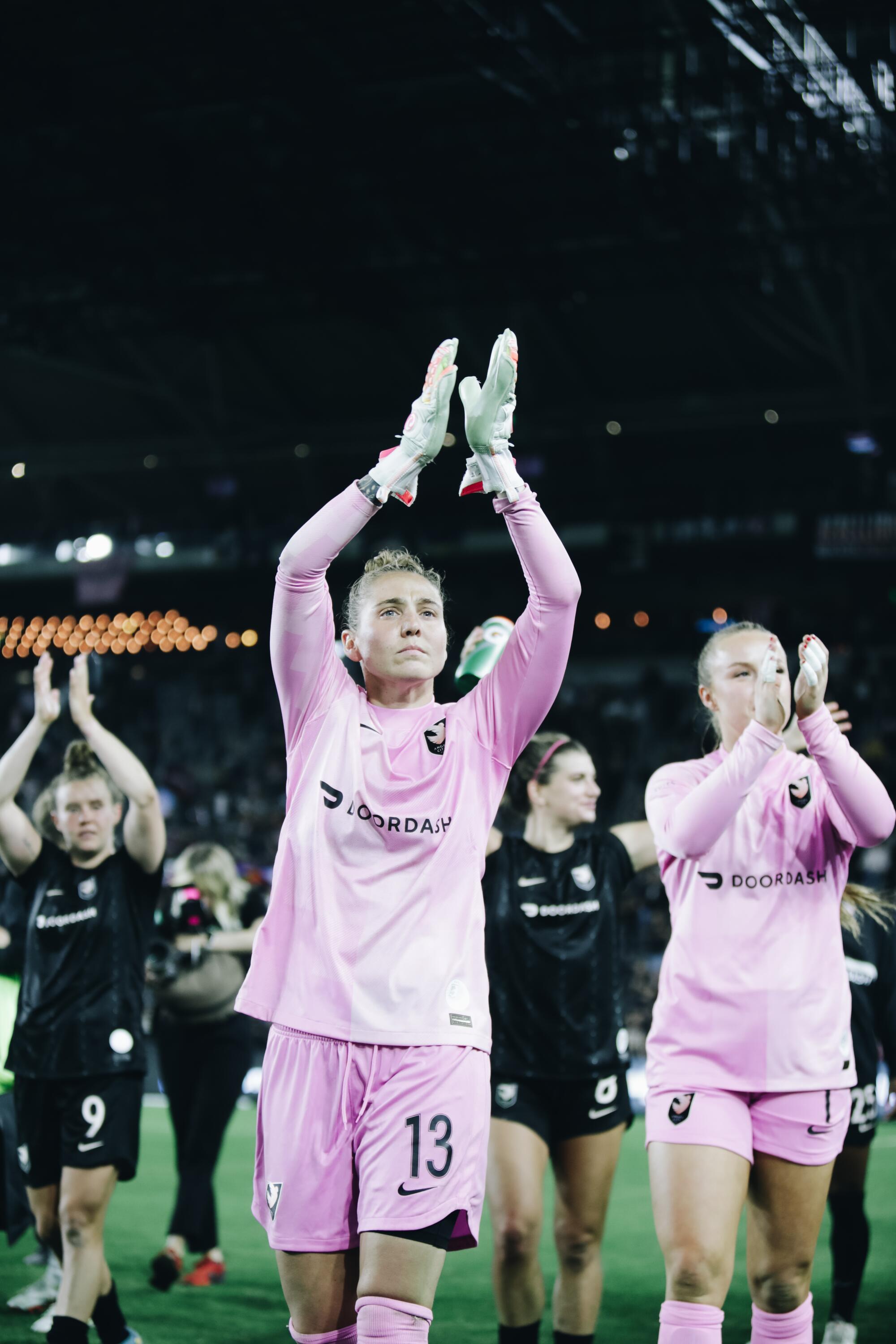
“My mom specifically told me she didn’t want me to come back and play for Bosnia,” Haracic said. “I told her no, because this is my country. This is where I was born. … I put my foot down. I need[ed] to do it for me.”
“I did cry on my first national team game day,” she continued. “The national anthem, I think it all sinks in. It’s truly a powerful moment.”
It wasn’t patriotism that brought Haracic back to a land she’d known for just the first few weeks of her life. It was family and history and, maybe, a chance at reconciliation.
“My aunt and my grandmother still live in the house that my mom was born in,” she said. “You still see the bomb [damage], you still see the bullet holes. When I first went in with the national team, I went down into that basement and my aunt showed me the corner [where] we hid from soldiers.
“To see what has been damaged and the history and the stories behind that, that’s why I wanted to do it. … It was years ago and I truly believe in change.”
So does Ferrer Van Ginkel, who is as bubbly and playful as Haracic is serious and thoughtful. In her 23 years, she has undergone a number of transformations: a childhood in Brazil, then Spain; a solo move to the U.S.; a turn in a British reality show; then her first-division debut last summer with Tigres of Mexico’s Liga MX Femenil.
Even her name is a mash-up of identities and experiences that often causes people to pause.
“Yeah, they’re confused,” she said. “Me too.”
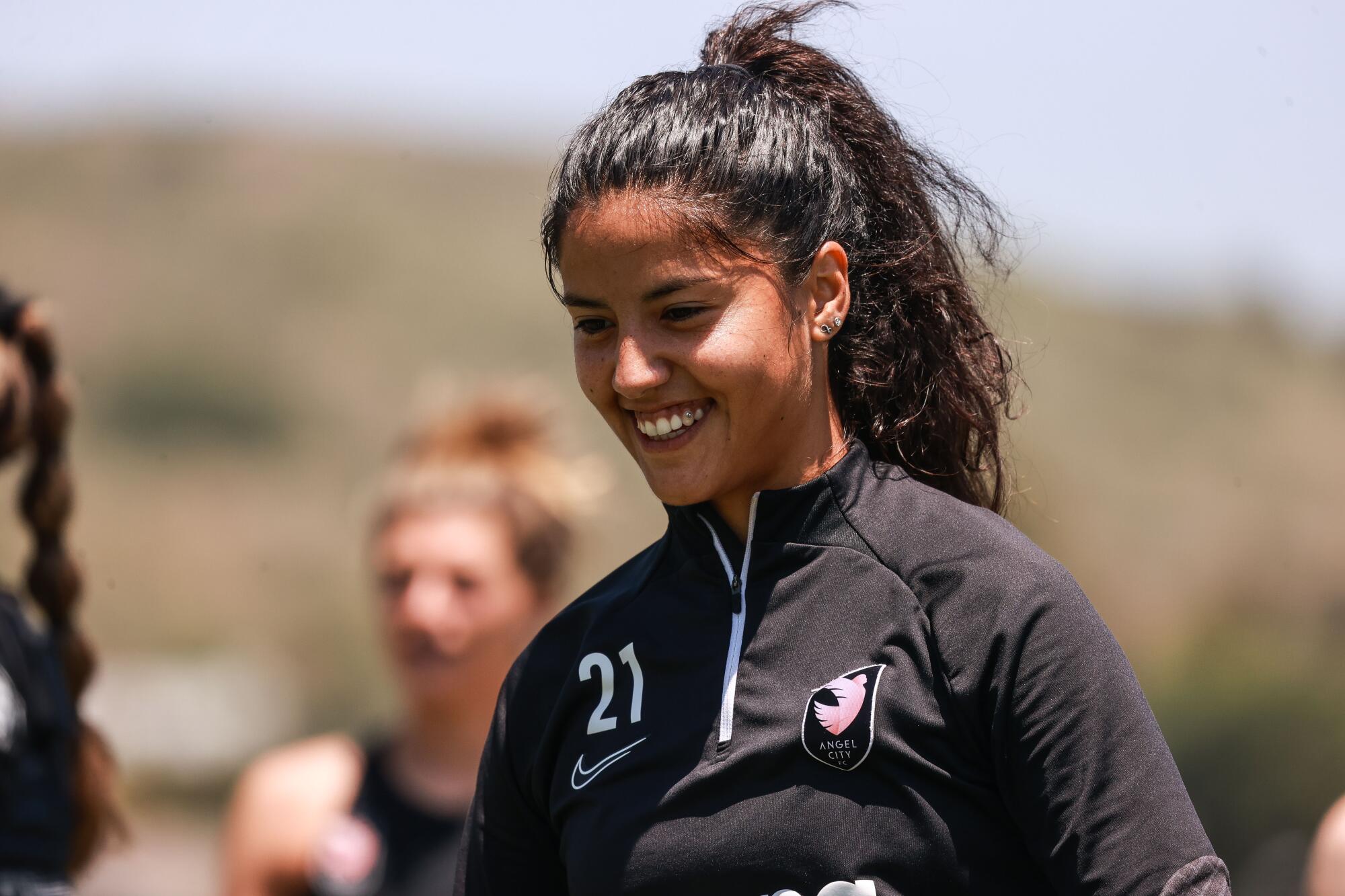
Ferrer Van Ginkel was 3 when she and her two sisters were put in an orphanage by her grandmother, who couldn’t afford to care for them. Her mother, she said, would stand outside the building and scream “give my kids back.” So the girls were moved to another orphanage.
Her older sister Larissa fought to keep the girls together, refusing to be adopted unless all three went to the same family. A Spanish couple, Francesc Ferrer-Alegre and Astrid Van Ginkel, eventually agreed to that, and when Ferrer Van Ginkel was 5 they took the girls to Spain, where they lived in Argençola, a Catalan village of about 200 people on the edge of a forest.
“I’m so grateful for my parents. They gave us a chance to get out of there, you know? It was the golden ticket,” said Ferrer Van Ginkel, who insists on using both parents’ names — the Spanish Ferrer and the Dutch Van Ginkel — as her own.
“I have faith in myself. I always put myself in places where it’s hard. I don’t want it to be easy. I like challenges.”
— Angel City FC’s Stefany Ferrar Van Ginkel
It didn’t feel like a golden ticket at first. Unsettled by the move and frustrated at her inability to speak Catalan or make new friends, Ferrer Van Ginkel took out her anger on the soccer field of her middle school.
“It’s something that kept me on the road. It’s something that kept me in check, something that I love doing,” she said.
As a child, Ferrer Van Ginkel was so good at soccer she was playing on boys’ teams when she was 12. At 17, she joined Espanyol B, a reserve team associated with Barcelona’s first-division club, before accepting a scholarship at West Virginia.
A midfielder, she scored 13 times in 66 college games but was not selected in the NWSL draft, so she auditioned for Ultimate Goal, a reality TV show in which 31 women are coached by former English national team legends, who try to turn them into professional players.
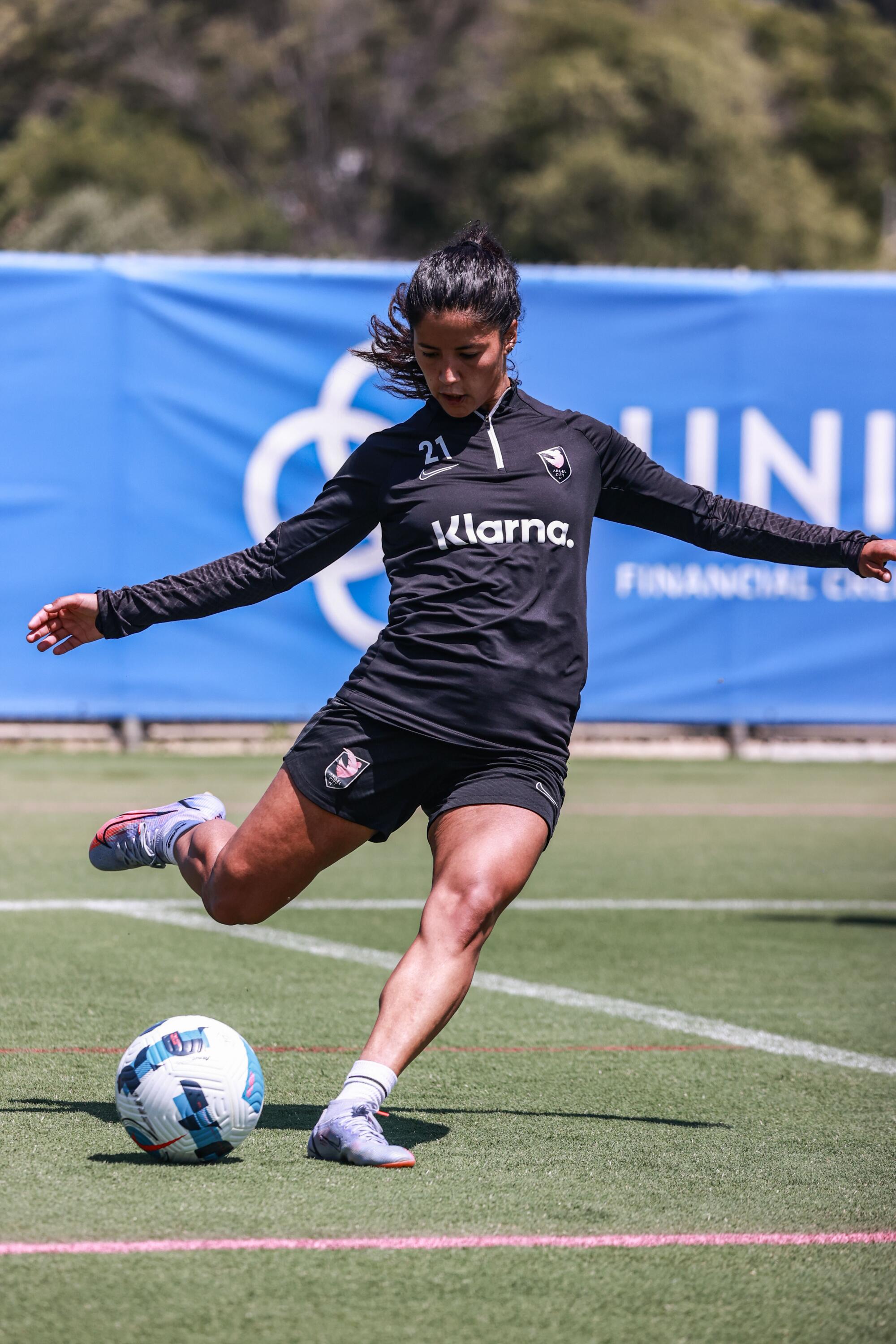
The exposure helped her land an agent, then a spot with Tigres in Mexico’s Liga MX Femenil, where she became the team’s first foreign-born player. The show also introduced her to Eni Aluko, one of the two TV coaches. Last spring, Aluko became Angel City’s first sporting director and seven months later she acquired Ferrer Van Ginkel in what is believed to be the first transfer paid with cryptocurrency.
So while the fact Ferrer Van Ginkel played just 14 minutes in the NWSL Challenge Cup and has yet to appear in a regular-season game is a source of frustration, that she’s playing professional soccer at all, she says, is a gift of fate.
Also a gift: She’s now playing in Hollywood for a team owned by actresses and producers.
“They were like, ‘You look like you’re 14 so you could definitely be on Disney,’ ” said Ferrer Van Ginkel, who is five months shy of her 24th birthday. “I would love to act. I’ve always wanted to do Pocahontas.”
Amanda Cromwell, a one-time investor in Angel City and the former UCLA women’s soccer coach, guides the Orlando Pride to a 1-0 win over Angel City.
Talk about typecasting. Pocahontas, born the daughter of a Native American chief, went through almost as many transformations as Ferrer Van Ginkel, converting to Christianity and marrying a colonial tobacco farmer before dying a favorite of English high society.
“Split decisions that you make can change a whole [life],” Ferrer Van Ginkel said. “Something that I’ve learned throughout the years is trust your gut, what you feel inside. I wanted to go to the U.S. and when I was in the U.S., I was like, ‘I’m going to go to Mexico.’ Because I know anywhere I go, I’ll make the best of that situation.
“I have faith in myself. I always put myself in places where it’s hard. I don’t want it to be easy. I like challenges.”
DiDi Haracic could say the same thing.

